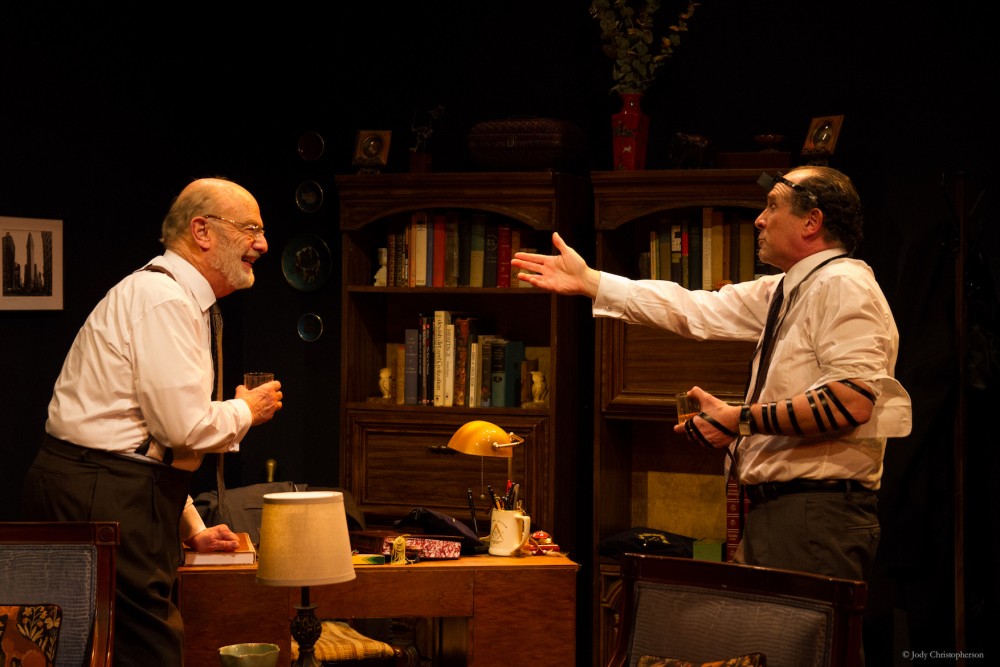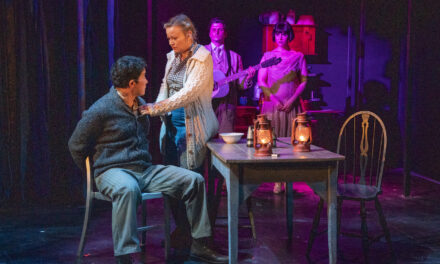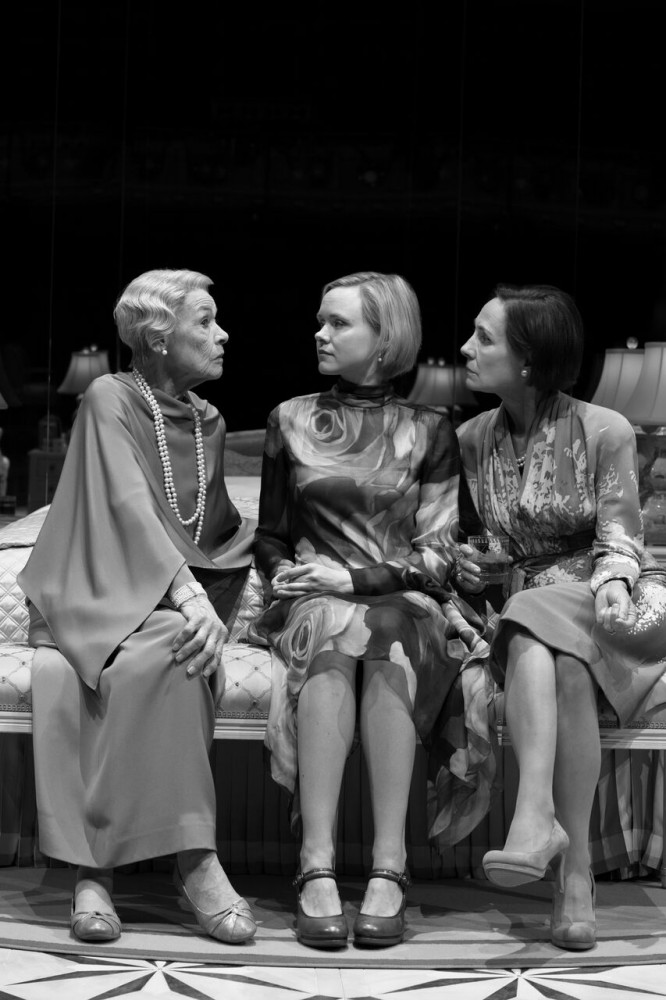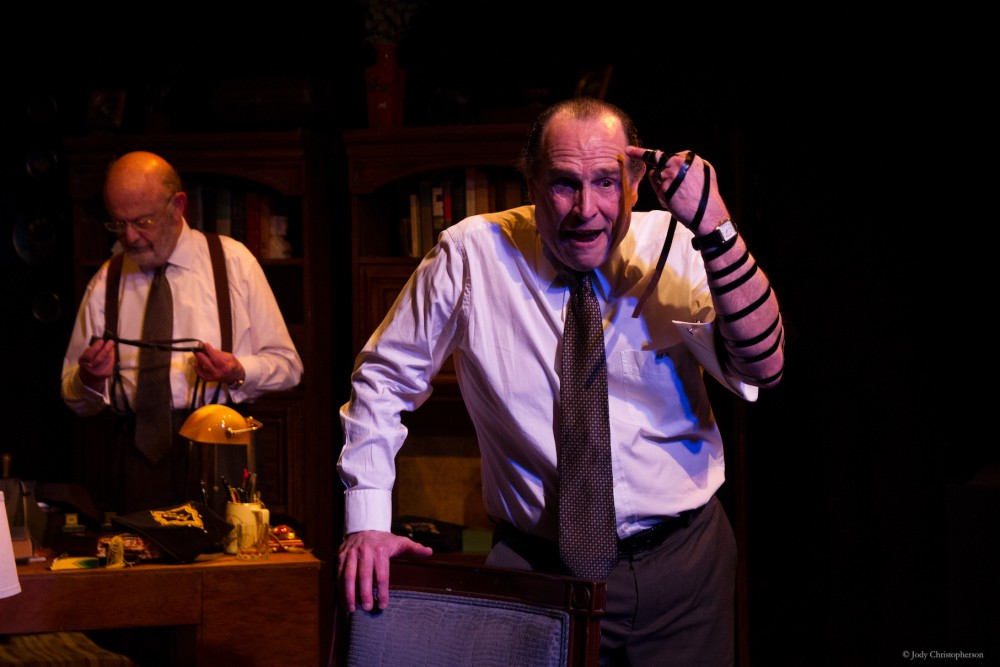
Gerry Bamman, Jeremiah Kissel
By Samuel L. Leiter
Audiences investing time and money in seeing New Light Theater Project’s production of Imagining Madoff, Obie-winning Deb Margolin’s (Turquoise) brainy take on the greatest financial swindler of our times, probably know of Bernard Madoff’s outrageous Ponzi scheme. That’s the one, of course, that cheated investors, from friends to charities, out of as much as $65 billion, destroying many lives in the process.
If they don’t, they’ll not learn much more about it from Imagining Madoff, which assumes sufficient familiarity with the remarkable story not to bother with documentary-like details. For those, they’d need to watch something like HBO’s The Wizard of Lies, starring Robert De Niro as Bernie.
Instead, audiences will discover a drama, sharply directed by Jerry Heymann, that’s thoughtful, loquacious, and sometimes mystical and abstruse; it’s also irregularly dramatic and, despite some emotional histrionics, only rarely moving. Essentially, Imagining Madoff is an intellectual fantasia relating the Madoff scandal to themes of ethics, morality, truth, Judaism, the Torah, the Talmud, the Midrash, faith, lust, guilt, trust, suffering, and betrayal. That’s a lot to unpack in an hour and 35 minutes.
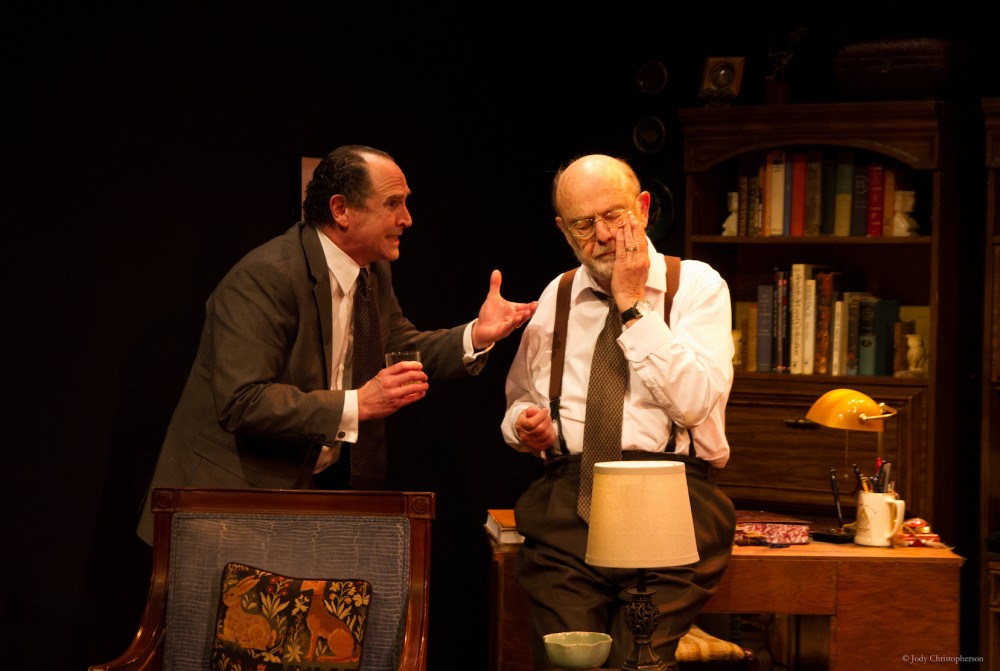

Jeremiah Kissell, Gerry Bamman
Three actors carry the play with lively, if not always consistent, performances. Jeremiah Kissel is a reasonable facsimile of Madoff. Gerry Bamman portrays Solomon Galkin, a fictional poet-philosopher and octogenarian Holocaust survivor with rabbinical knowledge, inspired by Elie Wiesel. (Wiesel, offended, actually tried to stop the 2010 premiere in Washington, D.C.) And Jenny Allen is Madoff’s loyal, long-serving, unnamed secretary.
The time-spanning action transpires across three locales, seen simultaneously on 59E59’s tiny Theater C stage. Galkin’s study is at our left, a chair on a raised witness stand is up center, and a jail cell is at our right. All are simply established by designer Dara Wishingrad, their spaces carefully demarcated by Michael O’Connor’s lighting.
Margolin cross-cuts the dialogue from Madoff answering an invisible biographer’s questions in his cell to the trial testimony of his secretary to Madoff’s all-night colloquy with Galkin, the one and only time he met him.
The remorseful secretary, hitherto ignorant of her boss’s transgressions, provides a closeup view of his personality and what it was like to work for him (including details like his never going to the bathroom). Madoff ruminates on his Jewishness, his wife, his sexual desires, his ambition and pride, and his fascination with, not money per se, but “the music of it,” and what it can do. Sol recalls his days in a concentration camp, philosophizes and moralizes, cites and explicates Talmudic riddles (“What is meant by ‘Thou makest men as the fishes of the sea?’”), debates with Madoff, and analyzes the story of Abraham and Isaac.
In what might be described as the central dramatic action, Galkin, impressed by how well Madoff’s investments appear to be doing for the temple he serves as treasurer, begs him to manage his funds. The financier then wrestles with his conscience before finally agreeing.
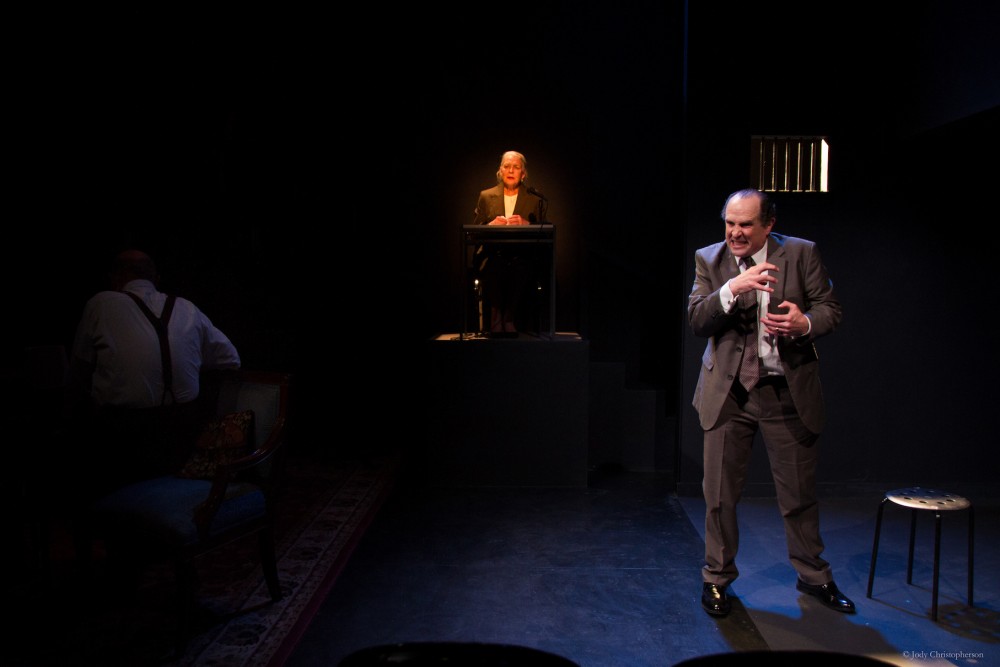

Jenny Allen, Jeremiah Kissell
When Madoff’s scheme crumbles, the betrayal of this survivor of the camps epitomizes the tragic damage done to all who put their blind faith in Madoff’s Midas touch. Toward the end, Madoff, in a piercing moment, gets to offer his cynical thoughts on “moral men.”
Kissler’s Madoff, dressed in a fine gray suit and tie (costumes by Kara Branch), has the street-hewn, profanity-laced tones of a New York-raised Jewish macher; listen to this recording and you may even think it’s Michael Cohen speaking. He captures the villain’s affability as well as his arrogance, not to mention his nervous tics, although his mannerisms sometimes turn actorish.
Bamman’s Galkin also walks a fine line between exaggeration and believability, including an odd, professorial accent that’s neither European nor particularly American. But he gets plenty of chances to display his solid grasp of the man’s scholarly acuity and passion.
The sincerest performance is that of Allen, whose stressful testimony eventually leads to a convincing emotional catharsis. Her responses to questions we don’t hear provide the play’s most purely human moments.
Although drama often takes a backseat to cerebration, Margolin is adept at providing intriguing images, like Galkin’s recalling a dead girl he saw in his camp, or Madoff’s dreams, including a weird one about his genitals. Distant memories, baseball, poetry, and religious esoterica occupy more time than Madoff’s malfeasance. There’s even a lengthy sequence when Madoff, a secular Jew, puts on tefillin (phylacteries). Interesting? Sure. Dramatic? Not particularly.
Those already with a ticket to this sold-out run of Imagining Madoff should be prepared for a play that’s sometimes more discussion than drama, more pilpul than provocation. I can’t guarantee how much but, if you go with that in mind, you should realize a return on your investment. Then again, didn’t Bernie say the same thing?
Imagining Madoff. Through March 23 at 59E59 Theaters, Theater C (59 East 59th Street, between Park and Madison Avenues). www.59e59.org
Photos: Jody Christopherson


